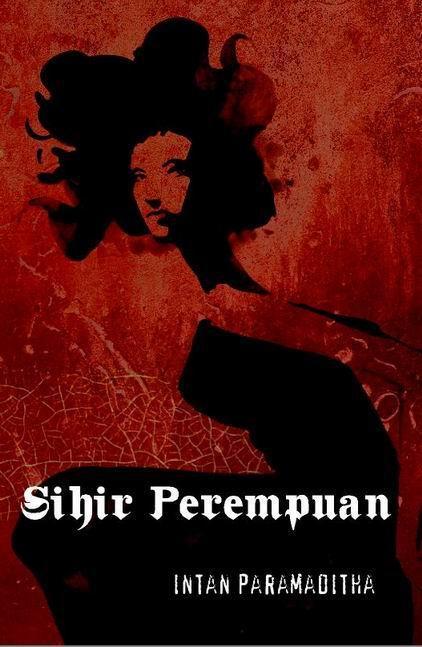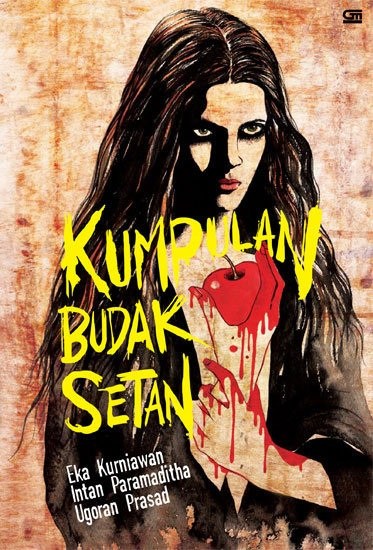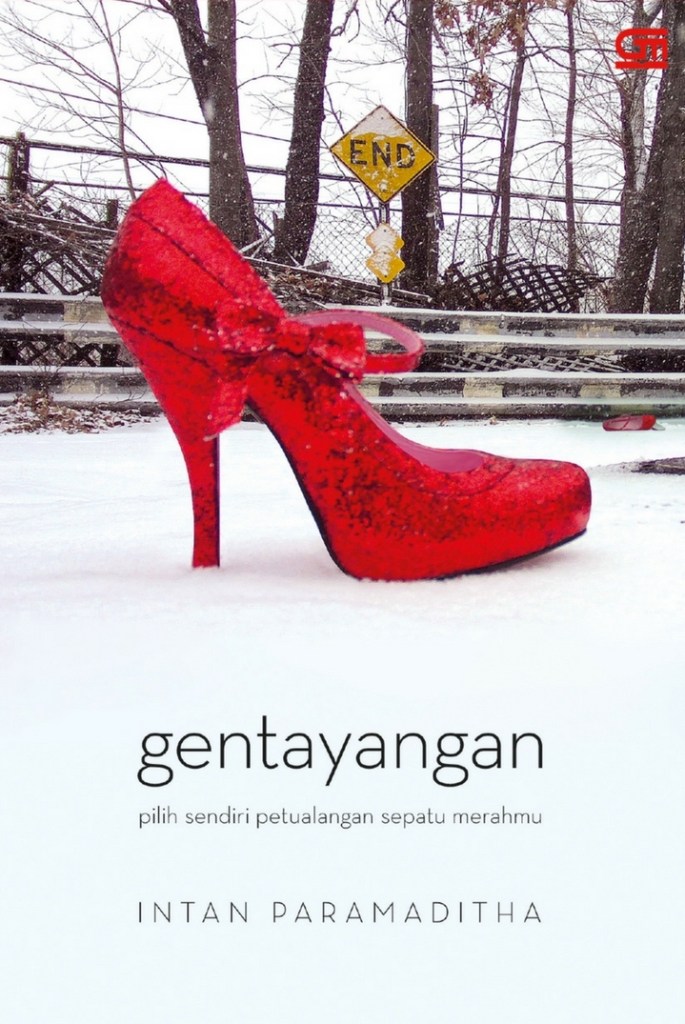It was sometime in 2015 when this writer had a conversation with two friends about Indonesian author Intan Paramaditha. "Who is she?" asked one of the friends. The other answered as she pointed at me, "The one who first poisoned her with feminism."
The word "Poisoned" made Intan sound like Snow White's Evil Queen; then again, if you've read her first book, she probably would take it as a compliment.
Intan Paramaditha
A compilation of short stories based on Western fairy tales and Indonesian urban legends with a feminist twist, Sihir Perempuan (Black Magic Woman)—as her debut book is called—came out in 2005. In it, Intan breathed a new life into the traditionally demonized characters, from Cinderella's stepsister to the menstrual-blood-licking female ghost that appeared in Indonesian mothers' cautionary tale as well as other mystical, powerful women that are considered out of the (patriarchal) norm. Deconstructive and thought-provoking, Intan's modern fairy tales forced her readers to reconsider the roles of female "villains" in stories.
The theme of gothic feminism continues in Intan's other works: The horror anthology co-written with fellow Indonesian authors Eka Kurniawan and Ugoran Prasad, Kumpulan Budak Setan (The Devils' Slaves Club, 2010); her play script, Goyang Penasaran (Obsessive Twist, 2011); her first novel Gentayangan (The Wandering, 2017) and a number of short stories she's published over the years.
Today, 11 of those stories have been translated into English by Stephen J. Epstein and compiled in an anthology entitled Apple and Knife. First published in Australia last March by Brow Books, Apple and Knife will soon reach an even wider audience, thanks to Harvill Secker that recently acquired the U.K. and Commonwealth rights for the book.
After receiving her PhD from New York University and becoming a lecturer at Sarah Lawrence College, Intan is currently based in Sydney where she teaches at Macquarie University. In spite of her busy schedule, Intan was not one bit the Evil Queen when Globetrotter reached out to her via email to talk about Apple and Knife and more! Read our chat below:
Globetrotter Magazine: Would you mind telling us about how Apple and Knife came about?
Intan Paramaditha: It started as a guerilla project. In 2015, Stephen J. Epstein told me that he wanted to translate my short story collection. He had translated a few for the 2015 Frankfurt Book Fair, and he would like to continue the work. The translation of Apple and Knife was completed at the end of 2016. We started looking for a publisher in Australia due to practical reasons—both of us live in the ANZ region (I live in Sydney and Stephen lives in Wellington, NZ). And boy, finding a publisher with one story collection and without an agent was really hard! Everyone—in Indonesia and beyond—told us that publishers were interested in novels, not stories. A few publishers rejected, or did not respond.
In April, Stephen submitted an excerpt of my novel to the literary magazine The Lifted Brow for publication. It turned out that the editor, Elizabeth Bryer, was interested. She asked if Stephen had more stories, which she would like to consider for The Lifted Brow’s new publishing imprint, Brow Books. The novel excerpt was finally published in Asymptote, not The Lifted Brow, but Brow Books decided to publish Apple and Knife. Brow Books is a small independent publisher, and I find them really rad and edgy in terms of both aesthetics and politics. I am really happy working with them.
Earlier this year, my agent Kelly Falconer from Asia Literary Agency (we met in October 2017, at Ubud Writers Festival) connected me to Ellie Steel, an editor at Vintage imprint Harvill Secker from the Penguin Random House group. Harvill Secker bought the UK and Commonwealth rights of Apple and Knife for publication in 2019. They will also publish my novel, Gentayangan in 2020.
Apple and Knife Cover
Globetrotter Magazine: Since some of the stories in the book were written many years ago, is there any story that you wish you could change? Or do you think the stories are still as relevant today as it was then?
Intan Paramaditha: Some of the stories are from my first book, Sihir Perempuan, which was published when I was 25. So some of them are 13 years old, or older. I have no regrets writing them, and I heard from several Australian readers that they are still relevant today with the Women’s March, the Me-Too campaigns, and the new global feminist movement. My concerns about women are the same, though they are more complex now. I just wish that those stories had been written by my more mature self!
Globetrotter Magazine: Why do you think horror works to deliver women's stories?
Intan Paramaditha: Horror disrupts our assumptions of reality. Patriarchy is still very much embedded within various aspects of our reality, whether in state policies, religious practice, and the capitalist system that we cannot escape from. A feminist perspective demands an interrogation of how patriarchy works. In that case it operates in the same way as horror: It questions and disturbs reality. I think horror has a lot of potentials for political intervention, but it’s important not to romanticize it as we have seen how horror is used to impose a conservative moral order.
L-R: Sihir Perempuan (Black Magic Woman), Kumpulan Budak Setan (The Devils' Slaves Club), Gentayangan (The Wandering)
Globetrotter Magazine: What do you wish English-speaking readers would get from this book?
Intan Paramaditha: An experience of reading that oscillates between the particular and the universal. The book is about women who resist structures that define them in ways that are unique, sly, subtle, or weird. Stories of resistance exist everywhere, and in bleak times such as today, we need to read more diverse stories about what resistance means. At the same time, the book is very particular; most stories are set in Indonesia, a place where capitalism, religion, legacies of feudalism, and the history of colonialism collide in interesting and often unsettling ways. I think it’s important to show that there is no singular Indonesian storyworld or universe; it cannot be reduced to some exotic villages and spiritual characters as in Eat, Pray, Love. And not all Indonesians are pious Muslims—something that Western media and conservative Indonesians would love to believe [laughs].
Globetrotter Magazine: In your experience, how do most foreign readers react to the Indonesian urban legends that make up your stories?
Intan Paramaditha: So far I think they see the Indonesian legends as an integral part of the feminist horror universe of Apple and Knife, together with the Western fairy tales that I also explore in the collection.
Globetrotter Magazine: Does living abroad affect your writing at all? In what ways?
Intan Paramaditha: Yes, it does. I lived in the U.S. for 11 years, and this is my second year in Australia. It makes me think about the issues of globalization and its problems of inequalities, cosmopolitanism, and displacement. I explore these issues further in my novel, Gentayangan, which will be published by Harvill Secker in 2020. It is a novel that asks questions around travel, mobility, and displacement. What does it mean to be a globetrotter, and what are its implications? Who has access to travel and who is excluded from the privilege of mobility? In the novel, the reader makes a pact with the Devil, puts on a pair of red shoes, and chooses their own path in the global village.
Globetrotter Magazine: Would you consider writing stories in English in the future?
Intan Paramaditha: No, at least not in the next 10 years [laughs]. I think about academic concepts in English; I guess this is because of my training as an academic who spent a decade at US higher education institutions. But bahasa Indonesia (Indonesian language - ed.) is the language of my fiction world. It is not only my native language but the first language I used when I started writing stories in the elementary school. I don’t know what will happen in 20 years, but today I think of stories in Indonesian.












